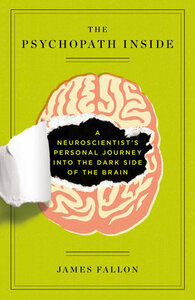Take a photo of a barcode or cover
183 reviews for:
The Psychopath Inside: A Neuroscientist's Personal Journey into the Dark Side of the Brain
James Fallon
183 reviews for:
The Psychopath Inside: A Neuroscientist's Personal Journey into the Dark Side of the Brain
James Fallon
I would have rated this hire if I didn’t get sick of the guy well before the end of the book.
Non-fiction memoir from a research neuroscientist who inadvertently discovered his brain scan is similar to that of the psychopathic killers he had been studying. Fallon is married, has a family, and does not show a history of violence; however, he admits he possesses many of the traits of a psychopath, such as lack of empathy and remorse, unreliability, impulsivity, putting loved ones in danger for the thrill of it, lying, manipulation, and narcissism. He provides plenty of examples from his life that demonstrate these traits. Fallon considers himself a “pro-social” (non-violent) psychopath, which he also refers to as “Psychopath Lite.”
In his words, “Love me or hate me, I was not a criminal. My brain may have looked a lot like those of the murderers I’d been studying, but I had never killed or ruthlessly assaulted anyone. I had never fantasized about committing violence or doing harm to another individual. I was a successful, happily married father of three—a pretty normal guy.”
I found the title intriguing. Ever since I had an extremely unpleasant encounter with a psychopath years ago, I have been occasionally reading about brain science, how psychopaths operate, and how to identify and avoid them. Many people with only a passing idea of psychopathy believe these people are hard-boiled killers, but what some may not realize is that a certain percentage of the population carries every negative trait of a psychopath except the violent criminal behavior. They lack empathy, and can be cold, calculating, superficial, and manipulative. They can also be glib and charming. Fallon estimates two percent of the population are psychopathic. I have read other books that put this figure as high as four percent.
If you are just starting down the path of reading up on brain science, I recommend starting elsewhere to get the basics down before tackling this book for a couple of reasons. 1) Fallon engages in an abundance of scientific analysis and uses jargon unfamiliar to many people. He speaks of chemical neurotransmitters, brain anatomy, psychotropic medications, epigenetic tagging, and similar related concepts, which merit a basic understanding in order to follow his train of thought. 2) He makes a few outlandish claims, which I don’t think anyone without at least a basic knowledge of these concepts would be able to refute, or even know they should be refuted.
Although he tries to remain objective, I do not think he succeeds. He spends a good amount of time excusing and rationalizing his actions. He argues that psychopaths are beneficial to society. In my opinion, his logic is flawed. Of course, I’m not a research scientist, but much of my reading does not lead to the same interpretations. He includes a plethora of personal information, some of which is unnecessary and repetitive, and as should come as no surprise, much of it sounds grandiose. Several chapters read like a thesis.
I found this book a very good guide on how a “pro-social” psychopath thinks. The last few chapters, in particular, are very telling. For example, he states, “But the inherent problem I could not shake is that, try as I may, I really just don’t care. There it is again. I do have some desire to keep the people around me happy, but that’s mostly because it makes my own life easier and more pleasant.” At any rate, it is an interesting memoir, providing you do not accept his conclusions at face value.
In his words, “Love me or hate me, I was not a criminal. My brain may have looked a lot like those of the murderers I’d been studying, but I had never killed or ruthlessly assaulted anyone. I had never fantasized about committing violence or doing harm to another individual. I was a successful, happily married father of three—a pretty normal guy.”
I found the title intriguing. Ever since I had an extremely unpleasant encounter with a psychopath years ago, I have been occasionally reading about brain science, how psychopaths operate, and how to identify and avoid them. Many people with only a passing idea of psychopathy believe these people are hard-boiled killers, but what some may not realize is that a certain percentage of the population carries every negative trait of a psychopath except the violent criminal behavior. They lack empathy, and can be cold, calculating, superficial, and manipulative. They can also be glib and charming. Fallon estimates two percent of the population are psychopathic. I have read other books that put this figure as high as four percent.
If you are just starting down the path of reading up on brain science, I recommend starting elsewhere to get the basics down before tackling this book for a couple of reasons. 1) Fallon engages in an abundance of scientific analysis and uses jargon unfamiliar to many people. He speaks of chemical neurotransmitters, brain anatomy, psychotropic medications, epigenetic tagging, and similar related concepts, which merit a basic understanding in order to follow his train of thought. 2) He makes a few outlandish claims, which I don’t think anyone without at least a basic knowledge of these concepts would be able to refute, or even know they should be refuted.
Although he tries to remain objective, I do not think he succeeds. He spends a good amount of time excusing and rationalizing his actions. He argues that psychopaths are beneficial to society. In my opinion, his logic is flawed. Of course, I’m not a research scientist, but much of my reading does not lead to the same interpretations. He includes a plethora of personal information, some of which is unnecessary and repetitive, and as should come as no surprise, much of it sounds grandiose. Several chapters read like a thesis.
I found this book a very good guide on how a “pro-social” psychopath thinks. The last few chapters, in particular, are very telling. For example, he states, “But the inherent problem I could not shake is that, try as I may, I really just don’t care. There it is again. I do have some desire to keep the people around me happy, but that’s mostly because it makes my own life easier and more pleasant.” At any rate, it is an interesting memoir, providing you do not accept his conclusions at face value.
challenging
informative
medium-paced
Very interesting information and theories, but the author/narrator is so incredibly narcissistic and selfish it was hard to finish.
informative
slow-paced
informative
reflective
slow-paced
informative
reflective
fast-paced
I try to build my judgment of this book on the awareness that who wrote it falls within the spectrum of psychopathy, so I can't "blame" him for the complacency and self-centeredness that transpire from the writing, in fact he admits it himself; I would have preferred, however, that all the personal episodes recounted were something that would frame a more "scientific" essay on psychopathy, in short, I would have liked to read more about psychopathy from a clinical/psychiatric point of view. To help bring down the quality of the book is the writing style reminiscent of the script of the trashy TV series, but I recognize again that this could be another aspect of his narcissism convincing him he can be able to capture the reader this way.
As a woman I couldn’t help but notice that he always portrays women as frivolous people whose sole purpose is to seduce men, and there is no psychopathic trait that can justify such a thought, only misogyny.
However, I went through some of the reviews and I read a lot of people expressing their worries about psychopaths walking among us, and here, in this particular point Fallon did, in my opinion, hit the mark, it really makes you think. I even liked when he sort of called out some of his acquaintances for getting cold towards him once they found out about his brain scan.
I think I actually appreciate him as a scientist, he’s undeniably brilliant, if only he had put his genius mind into this book…
As a woman I couldn’t help but notice that he always portrays women as frivolous people whose sole purpose is to seduce men, and there is no psychopathic trait that can justify such a thought, only misogyny.
However, I went through some of the reviews and I read a lot of people expressing their worries about psychopaths walking among us, and here, in this particular point Fallon did, in my opinion, hit the mark, it really makes you think. I even liked when he sort of called out some of his acquaintances for getting cold towards him once they found out about his brain scan.
I think I actually appreciate him as a scientist, he’s undeniably brilliant, if only he had put his genius mind into this book…
funny
hopeful
informative
inspiring
medium-paced
challenging
informative
medium-paced
didn’t actually finish it but still wrote a pretty decent essay about it so it counts





